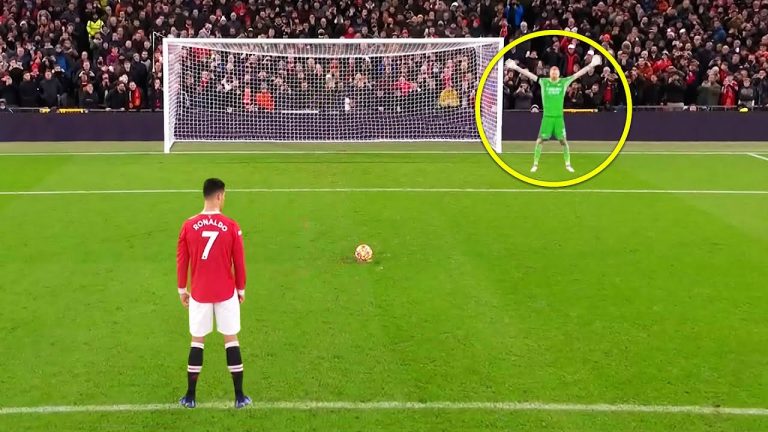In the high-stakes world of football, penalty kicks have become synonymous with intense drama and nerve-wracking moments. But what if there was a way to gain an edge over your opponent before even stepping foot on the pitch? Enter the realm of penalty kick mind games. These psychological tactics, employed by players and goalkeepers alike, aim to disrupt concentration, induce doubt, and ultimately tip the scales in their favor. From subtle gestures to strategic posturing, this article explores the fascinating world of penalty kick mind games and the impact they can have on the outcome of a match. Get ready to delve into the intriguing tactics that go beyond mere physical prowess, as we uncover the secrets behind this captivating aspect of the beautiful game.
- Psychological tactics: Penalty kick mind games involve using various psychological tactics to distract or intimidate the opposing goalkeeper and increase the chances of scoring. These tactics can include fake shots, hesitation, or changing the direction of the kick at the last moment.
- Mental pressure: Penalty kicks are high-pressure situations, and mind games can add an extra layer of mental pressure on both the kicker and the goalkeeper. The aim is to disrupt their focus, create doubt, and increase the likelihood of a mistake.
- Strategic advantages: Employing mind games during penalty kicks can provide strategic advantages to the kicker. By creating uncertainty in the goalkeeper’s mind, the kicker can gain an upper hand and increase the chances of successfully scoring the penalty.
- Ethical considerations: While penalty kick mind games are within the rules of the game, there are debates about the ethical implications of using such tactics. Some argue that it is a legitimate part of the game, while others believe it goes against the spirit of fair play and sportsmanship.
What do penalty mind games entail?
Penalty mind games are the psychological battles that unfold during a soccer penalty shootout. As the referee signals for a penalty, the tension in the stadium rises. Players must summon their focus, block out distractions, and assess their opponent’s strategy. It becomes a test of mental strength and composure, as each participant tries to outsmart the other and gain the upper hand.
In this intense moment, the keeper plays a crucial role. They must analyze the striker’s body language, attempting to decipher their intentions. Will they aim for the left corner or go for power in the center? The keeper’s ability to anticipate correctly can make all the difference between a save and a goal. Meanwhile, the striker must remain calm and composed, disguising their intentions to keep the keeper guessing until the last second.
The penalty mind games are a captivating spectacle, a battle of wits and nerves that captivates fans worldwide. It is a test of mental resilience, where split-second decisions and mind games can determine the outcome of an entire match. As the striker approaches the ball, the entire stadium holds its breath, waiting to see who will triumph in this thrilling duel of the mind.
What type of game is a penalty kick?
Penalty kicks in soccer are indeed a prime example of a zero-sum game. In this highly anticipated moment, the shooter and the goalkeeper engage in a simultaneous move, where one’s gain is directly balanced by the other’s loss. The pressure is palpable as the shooter aims to score, while the goalkeeper defends the goal with utmost determination. Every successful goal earns the shooter a point, while the goalkeeper’s failure results in a point lost. Thus, a penalty kick truly embodies the essence of a zero-sum game.
The dynamics of a penalty kick further reinforce the zero-sum nature of the game. As the shooter carefully selects a target, the goalkeeper must anticipate and react accordingly. With split-second decisions, both players are locked in an intense battle of skill and strategy. Each successful save by the goalkeeper denies the shooter a point, increasing the tension on the field. This constant back-and-forth showcases the zero-sum nature of the penalty kick, where any advantage gained by one player directly corresponds to a disadvantage suffered by the other.
Ultimately, the outcome of a penalty kick leaves no room for compromise or shared success. It is a binary situation where one player’s victory is inherently tied to the other’s defeat. While the shooter celebrates a successful goal, the goalkeeper experiences the disappointment of allowing one. Conversely, a save by the goalkeeper brings jubilation, but the shooter is left to ponder a missed opportunity. In this sense, a penalty kick stands as a clear representation of a zero-sum game, where any gain made by one player is completely offset by the loss experienced by the other.
What game is the term penalty kick associated with?
The term penalty kick is closely associated with the game of football. Introduced in 1891, penalty kicks serve as a consequence for more severe fouls committed within the designated area. This unique form of direct free kick is bestowed upon the attacking team and is executed from a spot precisely 12 yards (11 meters) away from the goal. During the penalty kick, all players, except for the goalkeeper, must remain outside the penalty area, adding an element of intensity and anticipation to this pivotal moment in the game.
Psychological Warfare: The Key to Penalty Kick Dominance
Psychological Warfare: The Key to Penalty Kick Dominance
In the high-pressure world of penalty kicks, mental strength can make or break a player’s performance. The ability to stay calm, focused, and confident is crucial for achieving dominance. By mastering the art of psychological warfare, players gain a powerful advantage over their opponents.
One effective tactic is to employ the power of visualization. By mentally rehearsing each kick, players can enhance their muscle memory and boost their self-belief. Visualizing success increases confidence and reduces anxiety, allowing players to step up to the spot with a clear mind and unwavering determination.
Another key aspect of psychological warfare is the art of deception. By studying their opponents’ patterns and weaknesses, players can strategically choose where to place their shots, increasing the chances of scoring. By disguising their intentions through body language and eye contact, players can further undermine their opponents’ confidence, leaving them guessing and vulnerable.
In conclusion, psychological warfare plays a vital role in penalty kick dominance. By harnessing techniques such as visualization and deception, players can gain a mental edge over their opponents, increasing their chances of success. Mental strength is the key to unlocking a player’s true potential and dominating the high-stakes world of penalty kicks.
Cracking the Mind Games Code: Secrets to Penalty Kick Success
Cracking the Mind Games Code: Secrets to Penalty Kick Success
Paragraph 1: Mastering the art of penalty kicks requires more than just technical skills on the field. The real secret lies in understanding the mind games that surround this crucial moment. By studying the psychology of both the kicker and the goalkeeper, players can gain a competitive edge. Developing a calm and focused mindset, visualizing success, and staying unpredictable are just a few strategies that can help crack the mind games code and increase the chances of penalty kick success.
Paragraph 2: One of the key secrets to penalty kick success is maintaining a calm and focused mindset. The pressure during these moments can be overwhelming, but by staying composed and blocking out distractions, players can approach the kick with clarity and confidence. Deep breathing exercises, positive self-talk, and visualization techniques can all contribute to achieving this mental state. By channeling their inner focus, players can outwit the goalkeeper and make the most of their penalty kicks.
Paragraph 3: Another crucial aspect in cracking the mind games code of penalty kicks is staying unpredictable. Goalkeepers often study the patterns and tendencies of the opposing team’s kickers, hoping to anticipate their next move. By introducing variations in technique, timing, and placement, kickers can keep the goalkeeper guessing. Whether it’s a sudden change in direction, a delayed shot, or a cleverly disguised chip, unpredictability can give the kicker a significant advantage. Mastering the art of surprise can be the key to unlocking penalty kick success and leaving the goalkeeper powerless.
Unleashing Your Mental Arsenal: Winning Penalty Kicks with Psychology
Unleashing Your Mental Arsenal: Winning Penalty Kicks with Psychology
In the pressure-cooker moments of a penalty shootout, where the outcome of a game hangs in the balance, it is not just physical skill that determines success. The secret weapon lies within the realm of psychology, where players can tap into their mental arsenal to gain the upper hand. By mastering the art of visualization, focusing on the present moment, and maintaining a confident mindset, players can unleash their mental prowess and increase their chances of converting penalty kicks into glorious victories.
Strategic Strikes: How Psychological Tactics Supercharge Penalty Kicks
Title: Strategic Strikes: How Psychological Tactics Supercharge Penalty Kicks
Paragraph 1:
In the high-stakes game of penalty kicks, mastering the art of psychological tactics can be the key to success. As the tension mounts, players who can stay calm and focused have a distinct advantage over their opponents. Strategic strikes go beyond mere skill, as players strategically deploy psychological tactics to destabilize the opposing goalkeeper and maximize their chances of scoring. From subtle feints to intimidating stares, these mind games can be the game-changer that propels a team to victory.
Paragraph 2:
As the pressure builds during penalty kicks, psychological tactics can make all the difference in securing the win. Players who understand the power of their body language can use it to their advantage, creating doubt and uncertainty in the goalkeeper’s mind. Whether it’s a confident and poised approach or a sudden change in direction, these calculated moves can disrupt the goalkeeper’s rhythm and increase the chances of finding the back of the net. By combining technical skill with psychological warfare, strategic strikes elevate penalty kicks to a thrilling battle of wits, where a well-executed mind game can be the ultimate game-winning weapon.
In the high-pressure world of penalty kicks, the mental game can make all the difference between victory and defeat. From subtle gestures to intense stares, players have mastered the art of mind games to unsettle their opponents and gain an advantage. By strategically playing with their opponent’s confidence and focus, penalty kick specialists have the power to tip the scales in their favor. So, the next time you see a player engaging in these mind games, remember that the battle is not just physical, but also mental, and it may just be the key to securing that crucial winning goal.



